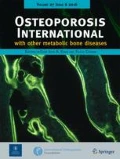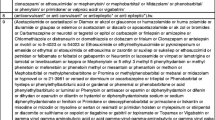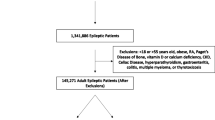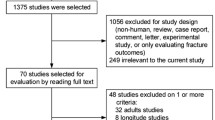Abstract
Background
Epilepsy is a common chronic neurological disorder, usually requiring long-term treatment with anti-epileptic drugs (AED). Many studies have reported that AED therapy is associated with metabolic bone disease and is a major iatrogenic risk factor for fractures. There remains uncertainty about the type(s) of bone disease due to AED treatment, and the pathogenesis of AED-associated fractures.
Rationale
Deficits in bone mineral density (BMD) are widely reported in AED-treated patient populations. However, much of the research conducted to date has been limited by factors such as small sample size, potentially biased subject selection, a lack of selection of appropriate control data, and failure to take account of important confounding influences. The pathogenesis of AED-associated fractures is likely to be multifactorial, due to factors including reduced BMD, impaired bone quality (due to osteoporosis and/or osteomalacia), increased propensity to fall, and fractures associated with seizures or loss of consciousness.
Recommendations
Patients receiving long-term AED should be monitored for indices of bone health, including BMD and vitamin D status. Lifestyle factors should be optimized, vitamin D status maintained, and fall prevention strategies introduced as appropriate. Good seizure control is important. The use of additional, specific osteoporosis therapy is not evidence-based in this setting, but would appear reasonable in patients with clinically significant decreases in BMD, applying current treatment guidelines for osteoporosis.
Conclusion
There is a pressing need for improved understanding of the pathogenesis of AED-associated bone disease, for better definition of the risk associated with specific AED regimens, and for the development of evidence-based preventive and treatment approaches in this common but neglected disorder.
Similar content being viewed by others
References
Sander JW (2003) The epidemiology of epilepsy revisited. Curr Opin Neurol 16(2):165–170
Kotsopoulos IA, van Merode T, Kessels FG, de Krom MC, Knottnerus JA (2002) Systematic review and meta-analysis of incidence studies of epilepsy and unprovoked seizures. Epilepsia 43(11):1402–1409
Kruse R (1968) [Osteopathies in antiepileptic long-term therapy (preliminary report)] (in German). Monatsschr Kinderheilkd 116(6):378–381
Schmid F (1967) Osteopathien bei antiepileptischer Dauerbehandlung. Fortschr Med 85:381–382
Valmadrid C, Voorhees C, Litt B, Schneyer CR (2001) Practice patterns of neurologists regarding bone and mineral effects of antiepileptic drug therapy. Arch Neurol 58(9):1369–1374
Hunter J, Maxwell JD, Stewart DA, Parsons V, Williams R (1971) Altered calcium metabolism in epileptic children on anticonvulsants. Br Med J 4(781):202–204
Richens A, Rowe DJ (1970) Disturbance of calcium metabolism by anticonvulsant drugs. Br Med J 4(727):73–76
Lifshitz F, Maclaren NK (1973) Vitamin D-dependent rickets in institutionalized, mentally retarded children receiving long-term anticonvulsant therapy. I. A survey of 288 patients. J Pediatr 83(4):612–620
Christiansen C, Kristensen M, Rodbro P (1972) Latent osteomalacia in epileptic patients on anticonvulsants. Br Med J 3(829):738–739
Strasser F, Driver L, Burton A (2003) Update on adjuvant medications for chronic nonmalignant pain. Pain Practice 3(4):282–297
Vasconcelos D (1973) Compression fractures of the vertebrae during major epileptic seizures. Epilepsia 14(3):323–328
Mattson RH, Gidal BE (2004) Fractures, epilepsy, and antiepileptic drugs. Epilepsy Behav 5(Suppl 2):S36–S40
van Staa TP, Leufkens HG, Cooper C (2002) Utility of medical and drug history in fracture risk prediction among men and women. Bone 31(4):508–514
Cummings SR, Nevitt MC, Browner WS, Stone K, Fox KM, Ensrud KE, Cauley J, Black D, Vogt TM (1995) Risk factors for hip fracture in white women. Study of Osteoporotic Fractures Research Group. N Engl J Med 332(12):767–773
Bauer DC, Browner WS, Cauley JA, Orwoll ES, Scott JC, Black DM, Tao JL, Cummings SR (1993) Factors associated with appendicular bone mass in older women. The Study of Osteoporotic Fractures Research Group. Ann Intern Med 118(9):657–665
Ensrud KE, Walczak TS, Blackwell T, Ensrud ER, Bowman PJ, Stone KL (2004) Antiepileptic drug use increases rates of bone loss in older women: a prospective study. Neurology 62(11):2051–2057
Lidgren L, Walloe A (1977) Incidence of fracture in epileptics. Acta Orthop Scand 48(4):356–361
Stephen LJ, McLellan AR, Harrison JH, Shapiro D, Dominiczak MH, Sills GJ, Brodie MJ (1999) Bone density and antiepileptic drugs: a case-controlled study. Seizure 8(6):339–342
Vestergaard P, Tigaran S, Rejnmark L, Tigaran C, Dam M, Mosekilde L (1999) Fracture risk is increased in epilepsy. Acta Neurol Scand 99(5):269–275
Souverein P, Webb DJ, Petri H, Weil J, Van Staa TP, Egberts T (2005) Incidence of fractures among epilepsy patients: a population-based retrospective cohort study in the General Practice Research Database. Epilepsia 46(2):304–310
Koppel BS, Harden CL, Nikolov BG, Labar DR (2005) An analysis of lifetime fractures in women with epilepsy. Acta Neurol Scand 111(4):225–228
Vestergaard P (2005) Epilepsy, osteoporosis and fracture risk—a meta-analysis. Acta Neurol Scand 112(5):277–286
Sheth RD, Wesolowski CA, Jacob JC, Penney S, Hobbs GR, Riggs JE, Bodensteiner JB (1995) Effect of carbamazepine and valproate on bone mineral density. J Pediatr 127(2):256–262
Kafali G, Erselcan T, Tanzer F (1999) Effect of antiepileptic drugs on bone mineral density in children between ages 6 and 12 years. Clin Pediatr (Phila) 38(2):93–98
Farhat G, Yamout B, Mikati MA, Demirjian S, Sawaya R, El-Hajj Fuleihan G (2002) Effect of antiepileptic drugs on bone density in ambulatory patients. Neurology 58(9):1348–1353
Pluskiewicz W, Nowakowska J (1997) Bone status after long-term anticonvulsant therapy in epileptic patients: evaluation using quantitative ultrasound of calcaneus and phalanges. Ultrasound Med Biol 23(4):553–558
Hahn TJ, Hendin BA, Scharp CR, Boisseau BA, Haddad JG Jr (1975) Serum 25-hydroxycalciferol levels and bone mass in children on chronic anticonvulsant therapy. N Engl J Med 292(11):550–554
Weinstein RS, Bryce GF, Sappington LJ, King DW, Gallagher BB (1984) Decreased serum ionized calcium and normal vitamin D metabolite levels with anticonvulsant drug treatment. J Clin Endocrinol Metab 58(6):1003–1009
Guo CY, Ronen GM, Atkinson SA (2001) Long-term valproate and lamotrigine treatment may be a marker for reduced growth and bone mass in children with epilepsy. Epilepsia 42(9):1141–1147
Tsukahara H, Kimura K, Todoroki Y, Ohshima Y, Hiraoka M, Shigematsu Y, Tsukahara Y, Miura M, Mayumi M (2002) Bone mineral status in ambulatory pediatric patients on long-term anti-epileptic drug therapy. Pediatr Int 44(3):247–253
Akin R, Okutan V, Sarici U, Altunbas A, Gokcay E (1998) Evaluation of bone mineral density in children receiving antiepileptic drugs. Pediatr Neurol 19(2):129–131
Oner N, Kaya M, Karasalihoglu S, Karaca H, Celtik C, Tutunculer F (2004) Bone mineral metabolism changes in epileptic children receiving valproic acid. J Paediatr Child Health 40(8):470–473
Verrotti A, Greco R, Morgese G, Chiarelli F (2000) Increased bone turnover in epileptic patients treated with carbamazepine. Ann Neurol 47(3):385–388
Verrotti A, Greco R, Latini G, Morgese G, Chiarelli F (2002) Increased bone turnover in prepubertal, pubertal, and postpubertal patients receiving carbamazepine. Epilepsia 43(12):1488–1492
Kroger H, Kotaniemi A, Vainio P, Alhava E (1992) Bone densitometry of the spine and femur in children by dual-energy x-ray absorptiometry. Bone Miner 17(1):75–85
Ecevit C, Aydogan A, Kavakli T, Altinoz S (2004) Effect of carbamazepine and valproate on bone mineral density. Pediatr Neurol 31(4):279–282
Erbayat Altay E, Serdaroglu A, Tumer L, Gucuyener K, Hasanoglu A (2000) Evaluation of bone mineral metabolism in children receiving carbamazepine and valproic acid. J Pediatr Endocrinol Metab 13(7):933–939
Sato Y, Kondo I, Ishida S, Motooka H, Takayama K, Tomita Y, Maeda H, Satoh K (2001) Decreased bone mass and increased bone turnover with valproate therapy in adults with epilepsy. Neurology 57(3):445–449
Gough H, Goggin T, Bissessar A, Baker M, Crowley M, Callaghan N (1986) A comparative study of the relative influence of different anticonvulsant drugs, UV exposure and diet on vitamin D and calcium metabolism in out-patients with epilepsy. Q J Med 59(230):569–577
Feldkamp J, Becker A, Witte OW, Scharff D, Scherbaum WA (2000) Long-term anticonvulsant therapy leads to low bone mineral density—evidence for direct drug effects of phenytoin and carbamazepine on human osteoblast-like cells. Exp Clin Endocrinol Diabetes 108(1):37–43
Valimaki MJ, Tiihonen M, Laitinen K, Tahtela R, Karkkainen M, Lamberg-Allardt C, Makela P, Tunninen R (1994) Bone mineral density measured by dual-energy x-ray absorptiometry and novel markers of bone formation and resorption in patients on antiepileptic drugs. J Bone Miner Res 9(5):631–637
Boluk A, Guzelipek M, Savli H, Temel I, Ozisik HI, Kaygusuz A (2004) The effect of valproate on bone mineral density in adult epileptic patients. Pharmacol Res 50(1):93–97
Andress DL, Ozuna J, Tirschwell D, Grande L, Johnson M, Jacobson AF, Spain W (2002) Antiepileptic drug-induced bone loss in young male patients who have seizures. Arch Neurol 59(5):781–786
Pack AM, Olarte LS, Morrell MJ, Flaster E, Resor SR, Shane E (2003) Bone mineral density in an outpatient population receiving enzyme-inducing antiepileptic drugs. Epilepsy Behav 4(2):169–174
Pack AM, Morrell MJ, Marcus R, Holloway L, Flaster E, Done S, Randall A, Seale C, Shane E (2005) Bone mass and turnover in women with epilepsy on antiepileptic drug monotherapy. Ann Neurol 57(2):252–257
Petty SJ, Paton LM, O’Brien TJ, Makovey J, Erbas B, Sambrook P, Berkovic SF, Wark JD (2005) Effect of antiepileptic medication on bone mineral measures. Neurology 65(9):1358–1365
Fitzpatrick LA (2004) Pathophysiology of bone loss in patients receiving anticonvulsant therapy. Epilepsy Behav 5(Suppl 2):S3–S15
Wark JD, Larkins RG, Perry-Keene D, Peter CT, Ross DL, Sloman JG (1979) Chronic diphenylhydantoin therapy does not reduce plasma 25-hydroxy-vitamin D. Clin Endocrinol (Oxf) 11(3):267–274
Koch HU, Kraft D, von Herrath D, Schaefer K (1972) Influence of diphenylhydantoin and phenobarbital on intestinal calcium transport in the rat. Epilepsia 13(6):829–834
Shane E (1996) Osteoporosis associated with illness and medications. In: Marcus R, Feldman D, Kelsey J (eds) Osteoporosis. Academic Press, New York
Rattya J, Pakarinen AJ, Knip M, Repo-Outakoski M, Myllyla VV, Isojarvi JI (2001) Early hormonal changes during valproate or carbamazepine treatment: a 3-month study. Neurology 57(3):440–444
Bjorholt PG, Nakken KO, Rohme K, Hansen H (1990) Leisure time habits and physical fitness in adults with epilepsy. Epilepsia 31(1):83–87
Morrell MJ (2003) Reproductive and metabolic disorders in women with epilepsy. Epilepsia 44(Suppl 4):11–20
Death AK, McGrath KC, Handelsman DJ (2005) Valproate is an anti-androgen and anti-progestin. Steroids 70(14):946–953
Johnell O, Nilsson BE, Walloe A, Wiklund PE (1979) Bone morphology in epileptics. Calcif Tissue Int 28(2):93–97
Elliott JO, Jacobson MP (2006) Bone loss in epilepsy: barriers to prevention, diagnosis, and treatment. Epilepsy Behav 8(1):169–175
Harden CL (2003) Menopause and bone density issues for women with epilepsy. Neurology 61(6 Suppl 2):S16–S22
Ott SM (2005) Long-term safety of bisphosphonates. J Clin Endocrinol Metab 90(3):1897–1899
Heller HJ, Sakhaee K (2001) Anticonvulsant-induced bone disease: a plea for monitoring and treatment. Arch Neurol 58(9):1352–1353
Collins N, Maher J, Cole M, Baker M, Callaghan N (1991) A prospective study to evaluate the dose of vitamin D required to correct low 25-hydroxyvitamin D levels, calcium, and alkaline phosphatase in patients at risk of developing antiepileptic drug-induced osteomalacia. Q J Med 78(286):113–122
Pedrera JD, Canal ML, Carvajal J, Postigo S, Villa LF, Hernandez ER, Rico H (2000) Influence of vitamin D administration on bone ultrasound measurements in patients on anticonvulsant therapy. Eur J Clin Invest 30(10):895–899
Drezner MK (2004) Treatment of anticonvulsant drug-induced bone disease. Epilepsy Behav 5(Suppl 2):S41–S47
Acknowledgments
This work was supported by the Epilepsy Association, the Victor Hurley Research Fund of Royal Melbourne Hospital, and the Australian National Health and Medical Research Council. Sandra J. Petty was supported by a postgraduate medical research scholarship of the Australian National Health and Medical Research Council.
Author information
Authors and Affiliations
Corresponding author
Rights and permissions
About this article
Cite this article
Petty, S.J., O’Brien, T.J. & Wark, J.D. Anti-epileptic medication and bone health. Osteoporos Int 18, 129–142 (2007). https://doi.org/10.1007/s00198-006-0185-z
Received:
Accepted:
Published:
Issue Date:
DOI: https://doi.org/10.1007/s00198-006-0185-z




